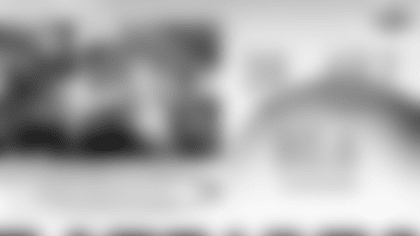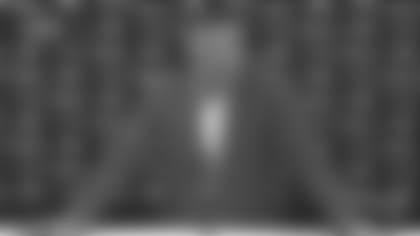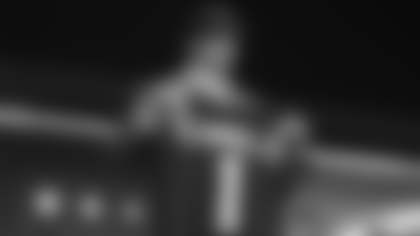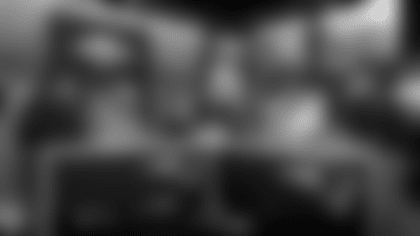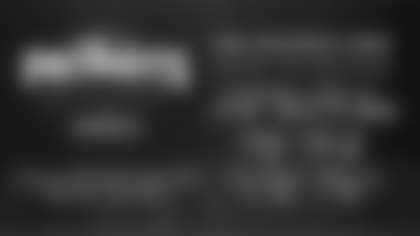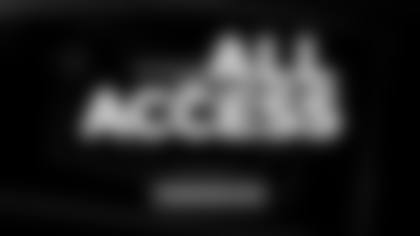NC: Thanks again for everybody sticking around. Hopefully your trade sheets are in good working order. Before we get started on the draft, just want to pass along our thoughts and condolences to the Celtics organization in regards to John Havlicek. I'm sure there's a lot of folks in this room that have been lifelong Celtics fans or who have followed the team. Everybody I'm sure heard the call multiple times, probably one of the more famous calls in sports about Havlicek stealing the ball. But our prayers and thoughts are with the Celtics organization and what he represented to a lot of people in this area and to their organization in general. I just wanted to make sure that we mentioned that here this evening. As it related to tonight, obviously there was a lot of movement. We moved up and down, side to side on the board. Where we ended up was picking four what we think are quality football players that have played against good competition and been productive at a fairly consistent level. So, we'll start in the beginning with Joejuan [Williams]. We traded up for Joejuan. You've probably talked to him already or may have talked to him, but he's a tremendously impressive kid. I would say he's very mature. He's a great person which is important. It says a lot about him and the things he's endured throughout his life. But as a player, he's got some unique attributes that not a lot of players in that position have. How that necessarily translates into our system, we'll find out. He primarily played in the perimeter at Vanderbilt. He was a perimeter corner and played against a lot of good people. He's a player we spent time with on a couple of different occasions. I think Coach [Bill Belichick] has made his trips to Nashville worth it here over the past however number of years. He's just an impressive kid. Where he's going to play, it's too early to determine that. What we do know is that he's played in the secondary at a good level against a lot of good people and been productive. He's a very smart kid. He [already] graduated. So, that was the first pick and then we were at [No.] 64 and shipped that back there a little bit, a few spots, kind of juggled some things around right and then we picked [Chase] Winovich there at [No.] 73 or whichever one that was. He was primarily an end-of-line scrimmage player at Michigan. He did a lot of things well in their system. [We] have a lot of respect for Coach [Jim] Harbaugh and the program that he runs and the defense that [Winovich] played in. He's been productive rushing the passer. He's got a good motor. He's a pretty instinctive guy. He's good with his hands. He's got pretty good technique and he's been productive over the course of a couple of years here now, and he's got long hair which I'm sure everybody will enjoy – until we tell him to cut it. He has some value, hopefully not only defensively but in the kicking game as well with his size at six-two-and-a-half, six-three, 245, 250 [pounds]. He runs fairly well, I think he ran a 4.6 [40 yard dash] or somewhere in that vicinity, so it's a pretty good combination of size and speed, toughness and instinctiveness. And then, [Damien] Harris, the running back from Alabama, I would say that's a situation relative to whatever else you're looking at, he falls into the good football player category that's been consistently productive over the course of however many years. Look, everybody knows what we think about the Alabama program and how highly regarded it is and the mutual respect that Bill and Nick [Saban] have for one another. But this is a player who over the course of the last three years basically has averaged 1,000 yards in the SEC and they have a lot of good backs. Similar to the Georgia situation with Nick Chubb and Sony [Michel], they have Harris, they have Josh Jacobs and they have a few more back in the pipeline. But this guy has been a pretty consistently productive player, so this is more of, I would say, falls into good football player category relative to the other options that we were looking at on the board, that's where he kind of fell. And then the pick there at the end of this round with Yodny Cajuste, the tackle from West Virginia, has primarily played left tackle. He played in a passing system. He's a fairly athletic kid. I think he's a three-year starter. He's a player we spent time with and a couple of different checkpoints here. I'd say all four of them are good football players. We think they're good football players. Hopefully they can come in here and assimilate to our program as quickly as possible. Whatever their role is going to be has yet to be determined. It's way too early for that, kind of like what we talked about last night with N'Keal [Harry]. Right now, we have three picks in the fourth round and I think we have four picks in the seventh round, so let's call it seven total picks if we wind up picking them. Along the way, we were able to sneak in a pick for next year as well with Chicago with is similar to what we did with them last year. That's kind of where we are here for today. We'll come back tomorrow morning, kind of re-calibrate and look at what our options may be. We have, in relative terms, a lot of picks relative to day three, so we'll have to see how it all shakes out. I'd say that's kind of a quick synopsis and I'll take some questions.
Q: When it comes to Joejuan, with the size obviously, do you feel like you had to react to a trend around the league where receivers are getting bigger and tight ends are essentially big receivers as well?
NC: Yeah, Bill [Belichick] mentioned that I think last week in his press conference. I wouldn't say that was an overriding factor. There actually aren't a lot of players in the league with those types of measurables. There have been some players in the past, like Sean Smith, a six-four, 210-pound corner or defensive back. But even at safety, there's not necessarily players with those types of dimensions. So, I wouldn't say necessarily that because we're playing against this, we need this. You start to do that and there might not be an application. You just actually look at the player and then say for his size, he has a pretty unique skill level relative to playing the corner position. So I wouldn't say necessarily it's in response to that. He's probably unique relative to other players at the position whether it's safety or corner. Like I said, if we were to look at this, which we haven't – we have, but we haven't – there aren't a lot of players in the secondary with his size, height/weight combination.
Q: If you look the roster, people would say entering the draft cornerback was already pretty well stocked and running back as well. Why pick those positions over tight end? How do you feel about the tight end position right now?
NC: It's the same as we do every year. We look at what's up there, we look at our options and we pick the players that we think are going to fit our team the best. We're not necessarily worried about what position they play. If you build up enough good football players over the course of time, then hopefully you put yourself in a good position. As we all know, there are other opportunities to add players to our team. Once the draft is over, then we enter the next phase of the team-building process. It's kind of an on-going thing. We're kind of at a fixed point in time right now in this three-day period, but we have a long runway in front of us so let's say we'll just continue to the next phase. In the interim, we just take it step-by-step, day-by-day and just try to pick players that we think fit us the best regardless of how we get them here.
Q: Are you comfortable with the tight end depth chart as it is right now?
NC: We're comfortable with the players on our team otherwise they wouldn't be here.
Q: How much do you value, with Joejuan, that he went up against A.J. Brown and Miles Boykin, the guys at Georgia who play high-level competition?
NC: One of the things you try to do with most players regardless of the position they play is watch them against the best competition possible because that's a little bit more of an indication of what they're going to see on a weekly basis. As we all know, in the SEC there's a lot of good players. We haven't run the stats yet, but I'm sure if you go back and look at the first two rounds, we're talking probably multiple players that played in the SEC that were picked. It's nothing new, but those players are good players and they're playing against one another on a week-to-week basis. So you try to evaluate them against the best competition because ultimately that's what they're going to play against. It's not necessarily going to be against a program that isn't quite at the level of some of those other teams. It's a part of the evaluation. You want to see them play and how they play against some of the better players.
Q: Based on the conference call, all of the players sound like really smart people. Do you not even consider players who aren't smart?
NC: Depends on what your definition of smart is. Look, the personal character makeup which encompasses their intelligence – in the end, it's about playing football, so how well they play football – but there's also a measure of, okay, they're going to get a lot of information so some can handle more information than others. All of us learn at different levels and capacities – Stacey [James] is smarter than I am, so he can probably handle more on his plate. Every player is different and once they get here, you start the process. Even if a person is smart or we perceive him as smart, maybe he has a little bit of trouble initially grasping a concept or the technique is new for him and he has a hard time adapting or adjusting. But we look at all the attributes that go into their profile and the intelligence level of a player because ultimately, things change, right? The game happens fast, there's going to be adjustments – okay, they're playing this technique, they're playing this front, they're playing a certain way, we have to adjust in-game, we've got to go to something else. So, can a player adapt quickly enough? So, the more players like that that you have on your team in your system, it just gives you an opportunity to make some of those adjustments and changes. It's more a credit to them and their coaches and their family and their background, how they were raised. Look, we have no impact on that. That's all we can do is evaluate it, but it's certainly an important part of our process.
Q: Chase Winovich described his interactions with your staff as limited during the process, so is it fair to say you got the sense very quickly that he would be a player that could handle a lot on his plate and had that mental adaptability that you seek?
NC: Yeah, there's different checkpoints and areas that you accumulate the information. It's not like we never saw the guy before, so you just take the information that you accumulate over the course of time and you feel comfortable or if you're not comfortable and you need more, you try to get more. Eventually you have to make a decision about well, here's where the player is and we're comfortable with it, and then we just move on to the next guy because we have to allocate time and resources to somebody else. I would say that if we weren't comfortable then we wouldn't have picked him.
Q: Do you have a sense of whether or not Yodny Cajuste could play on both sides?
NC: He's primarily played on the left side, Tom [Curran]. As you know with the offensive line, when they're on the field, they're going to play a lot of different spots. It's like when we drafted Nate [Solder] in whatever year that was. He played left tackle at Colorado. Well, his first year [in New England], he basically was the third tackle, jumbo tight end and he was playing right tackle. [Sebastian] Vollmer, Vollmer played left tackle primarily at Houston, he ended up playing both sides [in New England]. Trent Brown didn't play left tackle until he came into our program. So whatever their background is, that might be where their experience level is, so if we try them somewhere else, we'll see if they can handle it. I mean, Matt Light's another example going way back. Matt played left tackle. That was before I got here, but we moved him to right tackle or even talked about playing him at guard and then we eventually figured out that this guy's a pretty good left tackle and now he's in the Patriots Hall of Fame because he played however many years at a high level. Nothing's going to be predetermined. Their experience is what you see, but how that projects, we'll find out when he gets here.
Q: Yodny Cajuste played a lot of games in college but is relatively new to the sport. He was a really good basketball player – do you see some of the basketball traits in him, that athleticism, kind of stick out?
NC: Well one of the things he was fairly proficient in was pass protection, which there is a lateral change of direction element. Basketball's a different sport. I've never really coached that much in college but when you go to recruit and watch a guy play in high school, how many coaches have said, "Well, I saw this guy play basketball and I thought he was going to be a first round pick." You've heard that but you're looking for some athletic attributes in some of the players, how they transfer to football. Football's a different sport, but it's just another way to evaluate their athleticism. I've never seen the guy play basketball, but it sounds like he might have been a decent player.
Q: Cajuste didn't test at the combine because of the injury. Is it tough to gauge a player's athleticism against other players when those numbers just aren't available?
NC: I would say the combine measurements and some of that is very overrated. So, OK, the guy didn't jump or an offensive lineman didn't run a 40 [yard dash]. Tell me the next time an offensive lineman is going to run 40 yards down the field. I mean, it's ridiculous.
Q: Dan Connolly.
NC: Dan Connolly, right, exactly. Very good Ben [Volin]. So look, in the end, it's a measurement, it's a gauge but you have an estimate that if you don't have something tangible or something that's verified, you just have a general idea and you just sort of work off of that.
Q: When talking about projecting defensive backs to the next level, is it as difficult as projecting receivers because of the differences in volume, or is it easier because it's a more reactive position?
NC: That's a great question because it depends on what they're asked to do in college. Which I would say depending on the system, some corners are asked to do more than others. How the Alabama corners play is maybe different than maybe how another program plays. There's an element that you sort of have to – you don't see some of the things that necessarily we're going to ask them to do. Where it probably factors in more is in the adjustments, the multiples, the communication. And so the ability to process and then react to what you see? That's probably one of the biggest adjustments, as opposed to a guy just standing out there just kind of playing one technique or playing one coverage and maybe there's not as many multiples or adjustments that are involved. That's probably an area where they may be not necessarily behind, but in our system, maybe it's more than they're accustomed to, so how do they handle it and how do they process it? Which guys like Jon Jones, like Jason McCourty, like Steph [Gilmore], like Devin [McCourty], like Patrick [Chung], those guys can handle all that. If you were to go back and watch them play, they probably were not doing – I mean, they're doing some but not everything that we ask them to do. So, to a degree, it's just kind of flipped around. So bunch adjustments came, motion out of the bunch, cut-split, wide-split, motion-empty, communication – "Hey, if they do this, we're going to do that" – that's where I think some of the adjustment and changes come into play. So, that's a good question.
Q: When you're adding depth to the backfield, do you want to add players who have very similar skill sets so if one gets hurt, you have a direct backup? Or do you want guys who bring different things to the table?
NC: The more versatile you are, the more you can do, then that's going to enhance your ability to do more things. Guys like [Rex] Burkhead are versatile. He can run, he can catch, he can block. Sony [Michel]'s a good runner, James [White] is a good runner in his own way and he excels as a receiver. The game is sort of evolving here a little bit so if you can put a guy out there and he can do more than one thing, then that kind of gives you an advantage. We've been fortunate to have players like that through the years, like [Danny] Woodhead even in his role, Shane Vereen. Their skill sets are different, but the more versatile you are, it just kind of gives you the ability to be more flexible with your offense – Dion Lewis – we've been blessed and fortunate to have players like that. In Damien [Harris]'s case, he probably has some of those same types of qualities, so we'll see how it fits when he gets here.




